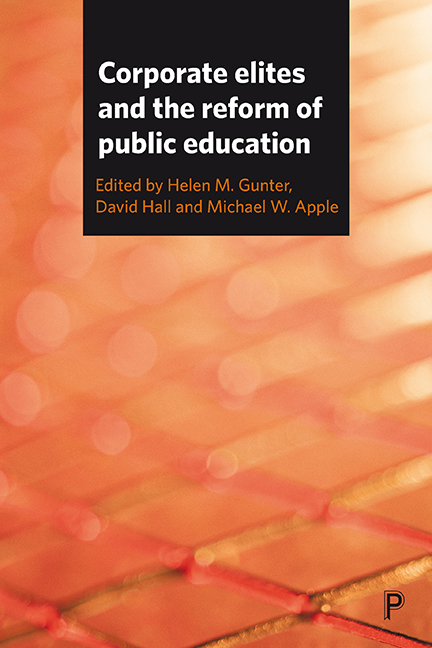Book contents
- Frontmatter
- Contents
- Foreword
- Notes on contributors
- Introduction: Scoping corporate elites and public education
- Part 1 Corporatised governance: system perspectives
- Part 2 Corporatised governance: provision perspectives
- Conclusion: The challenge of corporate elites and public education
- References
- Index
fifteen - When students ‘speak back’: challenging elite approaches to teaching, learning and education policy
Published online by Cambridge University Press: 05 April 2022
- Frontmatter
- Contents
- Foreword
- Notes on contributors
- Introduction: Scoping corporate elites and public education
- Part 1 Corporatised governance: system perspectives
- Part 2 Corporatised governance: provision perspectives
- Conclusion: The challenge of corporate elites and public education
- References
- Index
Summary
Introduction
This chapter comes at an interesting strategic juncture in this book – placed in the latter part – and I suspect placed deliberately so by the editors. It helps to focus attention on how corporate governance and provision are experienced in everyday learning within and out of school. Everything that occurs in the educational policy domain can ultimately be ‘read off’ in terms of what happens to students, and how they respond. I want to frame the opening part of this chapter around two orienting concepts: the first is the canary in the educational coalmine – a harbinger of the effect of what corporate elite policies are doing; and the second, what Sheehan (2013) refers to as ‘callous capitalism’ – as a way of depicting how it is that the corporate elite policies do their disfiguring and deforming work. In the second part of the chapter, I will deal with the conditions that are turning young people off school, specifically, the most disadvantaged, followed by a discussion of the very different set of conditions these young people ‘speak into existence’ when they are permitted to re-engage with learning.
Canaries in the educational coalmine: in the context of ‘callous capitalism’
I am invoking the metaphor of the ‘canaries in the coal mine’, while also borrowing from the title of a book on Australia's economic and social wellbeing, to indicate the existence or otherwise of crucial ‘vital signs’ that point to a ‘vibrant society’ (Emerson, 2006) (or not as the case might be). There can be no better indicator of whether a society is ‘vibrant’ than how it treats its young people, and educationally the signs across most Western countries, especially in places that have most vigorously embraced the ideology of neoliberalism, are far from good.
The distressed young people I am referring to are the ones schools have given up on; they have been ‘pushed’ out or ‘shoved’ out of school, or otherwise propelled into some context that, while technically still in school, effectively exiles them by hermetically sealing them off in well-intentioned re-engagement programmes, but in which there is still a heavy intent of preventing them from contaminating other students.
- Type
- Chapter
- Information
- Corporate Elites and the Reform of Public Education , pp. 219 - 232Publisher: Bristol University PressPrint publication year: 2017



